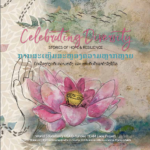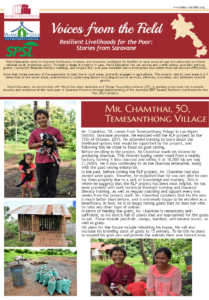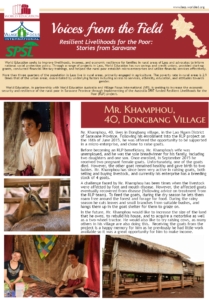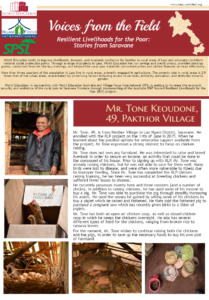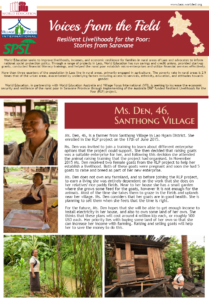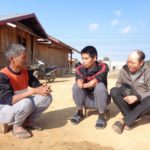
From 2014 to 2017, the Victim Assistance Support Team (VAST) was part of World Education Laos’ Integrated Unexploded Ordnance (UXO) Victim Assistance Support Project. In Xieng Khouang Province, VAST conducted a comprehensive needs assessment to identify gaps in services for UXO survivors and created action plans for 200 UXO survivors and their families including livelihoods development, psychological support, support to continue education and scholarships and referrals to vocational schools and on-the-job training. The project also developed the first ever UXO survivor database for Xieng Khouang province to improve case management and monitoring.
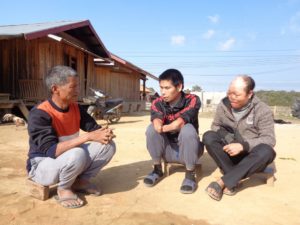
Victims Assistance Support Team peer-to-peer support facilitators Yeiyang (right) and Tuey (middle) counsel a UXO survivor about mental health in Xieng Khouang province, Lao PDR in January 2018.
VAST education, livelihoods, and financial literacy interventions improved the economic situation for UXO survivors and their families. Over 100 UXO survivors and family members received educational support, including school uniforms, books, pens, pencils, shoes, bags, and enrollment fees. Through a subgrant to the Quality of Life Association (QLA), a local nonprofit, 60 UXO survivors received animal husbandry and financial literacy training along with a grant to purchase animals.
VAST administered psychosocial assessments to more than 200 UXO survivors, evaluating their physical, social, and psychological needs to determine their overall mental health status. Based on assessed need, VAST facilitated survivors’ and their families’ access to provincial hospitals, schools, and vocational training centers. VAST also conducted peer-to-peer support workshops, where UXO survivors came together to share experiences and discuss how to overcome the physical and mental challenges of life after a UXO accident.
In addition, VAST improved first aid and mental health services in Xieng Khouang province by creating a standard national first aid curriculum approved by the Ministry of Health, and training approximately 350 Village Health Volunteers in first aid. A Lao professional psychologist also trained nurses at each district hospital in mental health diagnosis and treatment so that UXO survivors and other patients could be served locally and efficiently.
VAST worked closely with QLA as well as the Ministry of Health, Center for Medical Rehabilitation, and provincial and district hospitals in Xieng Khouang to build their capacity to support UXO survivors. QLA facilitated People with Disabilities Inclusion Committee meetings at the district level to engage government staff in efforts to reduce stigma and increase community accessibility and inclusion for persons with disabilities.
At the end of the VAST program, QLA took ownership of the UXO survivor database, assumed much of VAST’s caseload, and continues to provide psychosocial and livelihoods support for UXO survivors in Xieng Khouang. World Education continues to support UXO victims through administration of the War Victims Medical Fund.
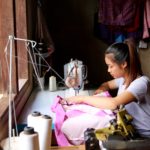
World Education Laos, through funding from the U.S. Department of State, established the first-ever Women’s Entrepreneurial Center (WEC) in Laos in 2017. The WEC’s goal is to foster the development of women-owned sustainable small businesses in Laos by providing a space for incubating new business ideas and supporting the growth of existing businesses. Located in Vientiane Capital, the WEC offers in-house trainings on small business management, access to finance, online marketing, and basic English for business. The Center also provides scholarships to women from throughout Laos to attend extended vocational trainings on tailoring, hairdressing, weaving, and natural dyes, accompanied by business training and mentoring.
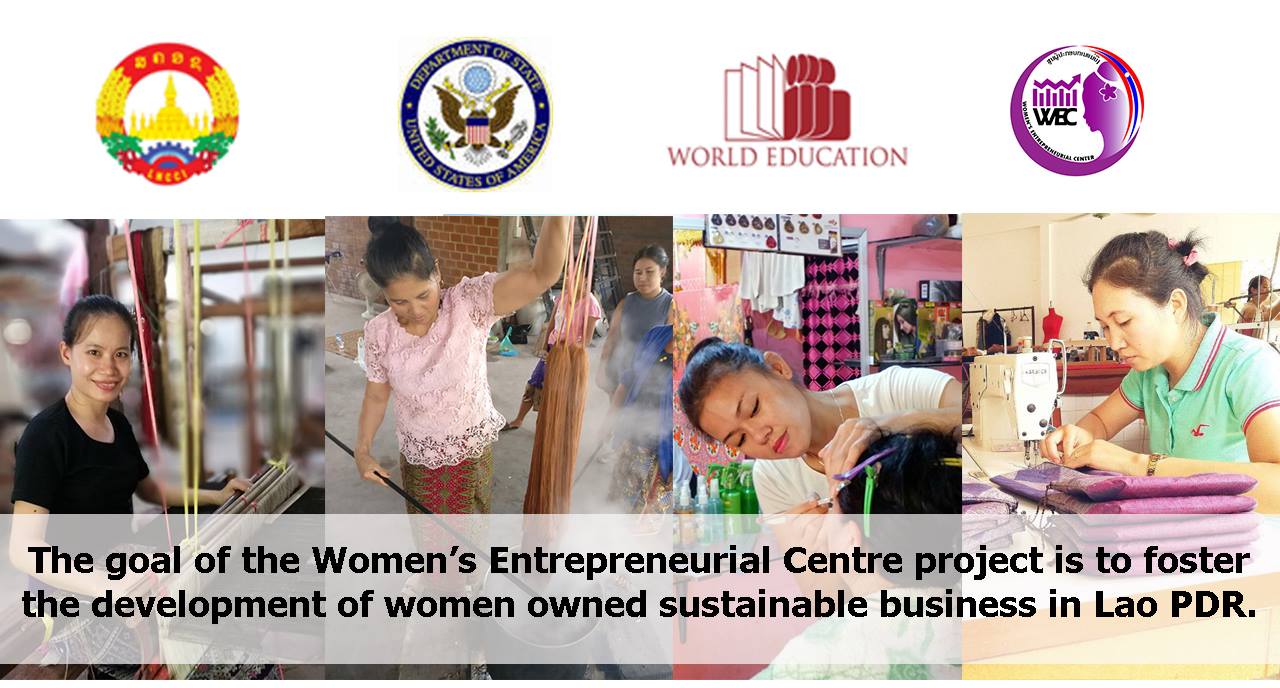
The WEC works in partnership with the Lao Women’s Union, the Lao Handicraft Association, the Lao National Chamber of Commerce and Industry, the Lao Business Women’s Association, and the Lao Microfinance Association to provide these services. Visit the WEC’s Facebook page to find out about recent trainings and opportunities to participate, and watch the video below to learn more:
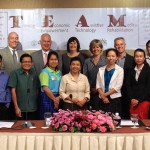
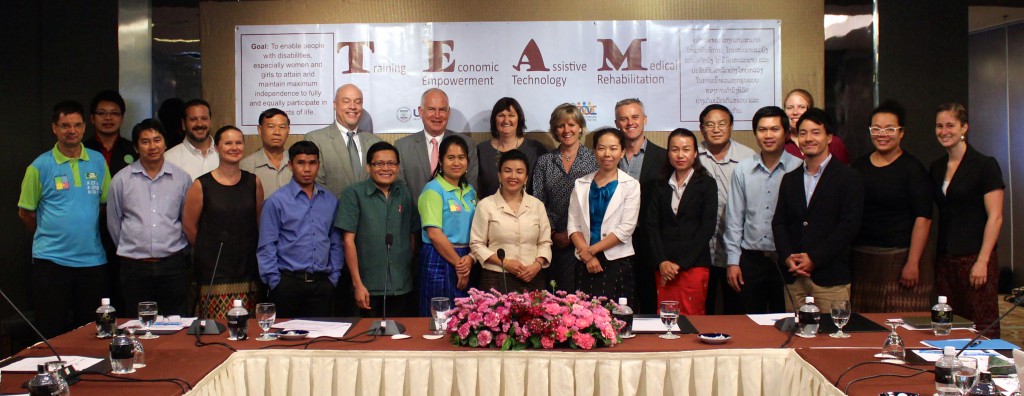
The TEAM project holds a ceremony to award its first 7 sub-grants to organizations in the disability sector in Laos. May 2015.
The World Education Laos TEAM project enabled Persons with Disabilities, especially women and girls, to attain and maintain maximum independence to fully and equally participate in all aspects of life. The approach for this project used a social model of disability and focused on four main components: Training, Economic Empowerment, Assistive Technology, and Medical and Physical Rehabilitation. The four of these together allowed the TEAM project to take a comprehensive social, right-based approach to improving services and have a positive effect on the quality of life and social inclusion for Persons with Disabilities in Laos.
Funded by USAID through JSI’s Advancing Partner’s and Communities program, TEAM awarded sub-grants to 15 local non-profit associations and international NGOs to implement projects that supported the development of the rehabilitation and disability sector. The partners collaborated to enhance the overall impact of all activities and create an environment in which Persons with Disabilities can access a wider range of services. The TEAM project further worked to strengthen the capacity of small partners to ensure organizational sustainability and increase effectiveness of organizations and programs that serve Persons with Disabilities.
Sub-grant partner project activities included:
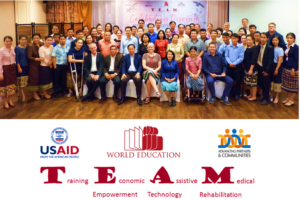
TEAM Project closing ceremony featuring World Education Laos and sub-grantees’ collective efforts and impact. 2017.
- Vocational training for women with disabilities
- Wheelchair basketball
- Psychosocial support for Persons with Disabilities and caregivers
- Awareness raising and training on autism spectrum disorder
- Training for medical and physical rehabilitation staff
- Job readiness training, job placement, and follow up support for Persons with Disabilities
- Inclusive education plans for children with disabilities
- Physical rehabilitation services and surgical/medical treatment for Persons with Disabilities
- Training for medical staff on early detection of impairments
- Livelihoods development trainings, small business management/financial management training, and provision of grants to help Persons with Disabilities start running their own business
- Disability rights and equality trainings for employers, government staff, and village leaders to encourage them to become advocates for change and inclusion
- Provision of assistive devices ranging from wheelchairs to devices for daily living to communication technology
- National Disability Policy and Strategy development and consultation workshops
To learn more about the achievements of TEAM, check out the documents, e-book, and video below:
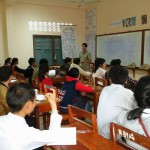
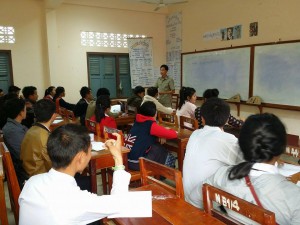
Students at the Salavane TTC receive instruction on the UXO Risk Education curriculum and answer questions to demonstrate their understanding of the curriculum.
Funded by the U.S. government, the Comprehensive Mine Risk Education (MRE) Project aims to reduce injury and death from unexploded ordnance (UXO) by informing school-age children about how to protect themselves and their peers. Formerly known as the UXO Education and Awareness Project, World Education (WEI) began developing a primary school curriculum about UXO safety in 1996. While the number of UXO accidents in Laos has decreased significantly since that time, children represented 53% of UXO casualties from 2016 to 2018, which demonstrates a continuing need to disseminate MRE to children. Today, the project reaches young people at risk of UXO accidents through curriculum in the formal education system as well as through puppetry performances at the community level. The overall emphasis is on building the capacity of the Ministry of Education and Sports (MOES) to manage MRE in the future. In the current three-year project period (2018-2020), the MRE project added Bolikhamxay as a target province and now reaches all 88 districts in Xieng Khouang, Luang Prabang, Houaphan, Khammouane, Sekong, Champassak, Savannakhet, Saravane, Attapeu, and Bolikhamxay provinces. Project activities include:
- Supporting the Government of Laos to integrate MRE into the national primary school curriculum, enabling over 500,000 children in 5,820 primary schools to receive messages about UXO safety;
- Developing a new handbook for teaching MRE in secondary schools;
- Ensuring 3,800 student teachers in the eight Teacher Training Colleges throughout Laos will learn how to teach MRE in primary schools.
- Enabling 220 puppetry troupes in primary schools to disseminate MRE to thousands of fellow students and community members throughout Laos.
WEI has developed a comprehensive UXO curriculum which includes a teacher guide, storybooks, songbooks, and posters for each primary school grade (grades 1-5). In the current project period, WEI is supporting MOES to integrate MRE lessons into the national primary school science and environment curriculum. As part of the national curriculum, MRE lessons will reach every primary school student in Laos. The MRE Project and MOES are also designing and piloting a new secondary school MRE handbook for the first time. The MRE curriculum emphasizes participatory learning, featuring student-centered activities and messages that are easy to understand and recall.
To further ensure the dissemination of MRE, the Project facilitates Trainings of Trainers (ToTs) to teach in-service teachers how to utilize the MRE curriculum in their classrooms. WEI also works closely with the eight Teacher Training Colleges of Laos (TTC) to develop MRE teacher training materials, support professors to teach MRE, include MRE in summer refresher courses for in-service teachers, and ensure all final year TTC students are prepared to teach MRE.
To complement the in-school MRE, the MRE puppetry program involves children and teachers from high-UXO risk communities to develop puppetry performances to bring the education about UXO out of the classroom and into communities. In 1999, WEI contracted the National Puppet Theater of Laos to train teachers to establish the first MRE puppetry troupes in Xieng Khouang, Houaphan, Savannakhet and Saravane Provinces. Today, WEI has worked with MOES to establish more than 88 troupes which perform on Teacher’s Day and Children’s Day, reaching between 70,000 and 80,000 community members each year throughout the 10 target provinces. Based on the success of these troupes, WEI will increase the number of puppetry troupes to 220 during the current project period to deliver MRE to even more community members and provide an engaging complement to the formal curriculum.
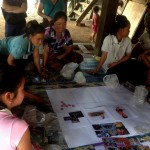
68% of the Laos population live in rural areas, where subsistence farming remains the dominant livelihood for many families. The poverty rate in rural areas of Laos is 2.9 times that of urban areas, and one-third of the population in rural upland areas is still below the poverty line. World Education, in partnership with World Education Australia and Village Focus International, implements the Resilient Livelihoods for the Poor (RLP) Project in Saravane Province, where there is a higher poverty rate (48.2%) than any other province in the country.
After conducting a comprehensive survey of target villages, RLP selected its first cohort of 198 households. Criteria for household selection include: selling their labor, having a health equity or health care card, inadequate housing, little or no productive land and/or assets, and persons with disability living in the household. An additional 202 households were later added to the project.
Each household in the project cohort receives a productive asset (i.e. livestock) and comprehensive support throughout the first year through bi-weekly household visits, training sessions, and asset support grants. Through the development of these sustainable micro-enterprises, RLP enables the poorest households in the community to have a sustainable livelihood that lasts beyond the program, access savings to expand enterprises, and plan towards their future.
More information can be found at the Resilient Livelihoods for the Poor website.
World Education Value Chain Assessment — Lao Ngam 2016
Posters created through the Resilient Livelihoods for the Poor Project (English and Lao versions):
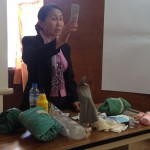
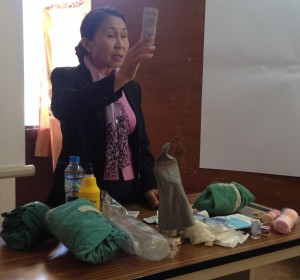
A medical trainer in Xieng Khouang province demonstrates techniques for washing wounds and suturing.
To improve UXO accident victims’ rate of survival and rehabilitation after an accident, World Education has, for over a decade, been improving Laos’ emergency and trauma care medical systems through training and the provision of equipment. Since 1995, World Education has been assisting UXO-affected communities by upgrading the medical, surgical, and emergency services of district and provincial health facilities and training emergency medical personnel in clinical, diagnostic, and management skills.
The most recent Medical Capacity Development project began in 2012 and has three main objectives: to improve the trauma care training capacity of Lao medical trainers in UXO impacted areas, to develop a standardized National First Aid Curriculum for the training of Village Health Volunteers, and to develop a curriculum in Critical and Emergency Care Nursing with the Faculty of Nursing Sciences at the University of Health Sciences of Lao PDR.
Beginning in 2012, with funding from the U.S. Department of State Office of Weapons Removal and Abatement (WRA), World Education developed a trauma care training curriculum and a training of trainer curriculum for medical trainers. In 2014 and 2015, after completion of developing these curricula in 2013, World Education (with support from the Centre for Medical Rehabilitation and the Ministry of Health) has facilitated two Emergency and Trauma Care Trainings that have reached 70 medical trainers in four provinces (Xieng Khouang, Saravan, Houaphan, and Sekong). These trainings will ensure that Laos Medical Trainers will be able to take responsibility for and implement emergency and trauma care trainings in their hospitals.
In 2014, The Medical Capacity Development team worked with the National First Aid Technical Working Group (FAWG), which consists of members from the INGO community and the Ministry of Health, to develop a National First Aid Curriculum. In finalizing the curriculum, World Education facilitated three pilot trainings with 74 total participants who provided relevant and practical feedback on the curriculum. The curriculum was approved by the Ministry of Health in August 2015, and the MCD team has since conducted four training of trainer sessions in Xieng Khouang and Houaphan provinces. Implementation of this National First Aid Curriculum throughout Laos will help standardize first aid care among Village Health Volunteers who provide essential medical care on a community level throughout Laos.
World Education has also supported the Faculty of Nursing at the University of Health Sciences of Lao PDR in developing a curriculum for Critical and Emergency Nursing. When the curriculum development is complete, student and teacher manuals will be developed and Training of Trainer workshops will be held to facilitate the effective utilization of the Critical and Emergency Nursing curriculum at the University of Health Sciences of Lao PDR. This will strengthen the capacity of nursing students in Laos to provide adequate care to UXO accident victims.
Access a copy of the First Aid Curriculum for village health practitioners.
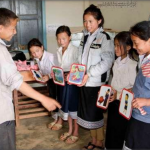
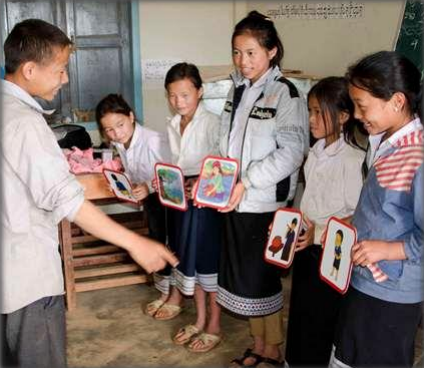 The Reducing Childhood Diarrhea (RCD) project in Xieng Khouang province, northern Laos combined community mobilization, education, and simple technologies to reduce the impact of diarrhea on children’s health. The project combined a behavioral change intervention proven to have impact in rural Lao communities – Community Led Total Sanitation (CLTS) – with a low cost approach to disease mapping. Community Health Technicians (CHTs) received training from World Education staff in basic epidemiology, WASH (Water, Sanitation, and Hygiene) principles, data collection, and the use of GPS enabled mobile phones.
The Reducing Childhood Diarrhea (RCD) project in Xieng Khouang province, northern Laos combined community mobilization, education, and simple technologies to reduce the impact of diarrhea on children’s health. The project combined a behavioral change intervention proven to have impact in rural Lao communities – Community Led Total Sanitation (CLTS) – with a low cost approach to disease mapping. Community Health Technicians (CHTs) received training from World Education staff in basic epidemiology, WASH (Water, Sanitation, and Hygiene) principles, data collection, and the use of GPS enabled mobile phones.
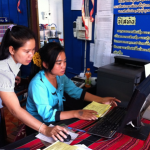
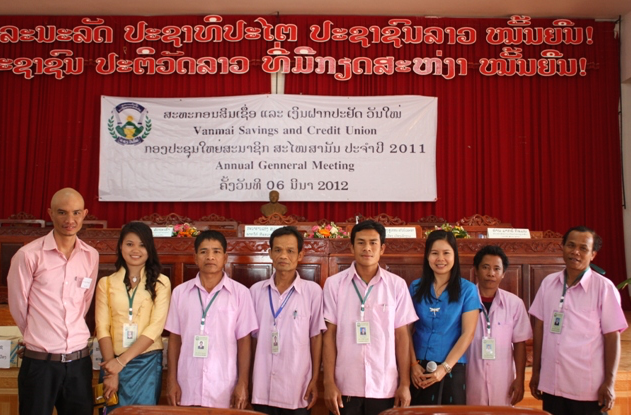 Only about 15% of households in Laos have access to formal financial sources. Poor rural communities in Laos do not have access to secure and reliable financial services. Consequently, families are unable to make significant investments in developing their livelihoods, weather economic shocks, and save for the future. World Education Inc. and World Education Australia (WEAL) established an autonomous, locally owned and managed microfinance agency in Saravan Province in southern Laos.
Only about 15% of households in Laos have access to formal financial sources. Poor rural communities in Laos do not have access to secure and reliable financial services. Consequently, families are unable to make significant investments in developing their livelihoods, weather economic shocks, and save for the future. World Education Inc. and World Education Australia (WEAL) established an autonomous, locally owned and managed microfinance agency in Saravan Province in southern Laos.
As a result of these efforts, Vanmai (which means “New Day” in Laos) Savings and Credit Union (SCU) was formally established in November 2010. The premise behind it was to create an institution that met the financial needs of local people, offering a safe place to save and access loans. Its mission is “to meet the needs of members by providing transparent, sustainable, effective, and fair service to the members so they can improve their living conditions.”
Vanmai has a Board of Directors that meets monthly, a Credit Committee that meets to discuss and approve loans once a week, and an Audit Committee that conducts monthly internal audits. Full-time staff includes a manager, two credit officers, an accountant, and a cashier. World Education trained the Vanmai staff and boards to improve both their technical knowledge and skills and their leadership and management skills. Some training topics included “Credit and Delinquency Management,” “Marketing and Product Development,” “Leadership Skills,” and “Service with a Heart.” The Vanmai staff also visited established SCUs throughout southern Laos to observe best practices and receive helpful advice.
The project also provided trainings for Vanmai members. As most members were farmers or small business owners, training topics included “Animal Raising and Agriculture” and “Starting a Small Business.” Staff, boards, and members all received a “Gender Equity and Awareness” training.
In 2010-2011, Vanmai was officially recognized by law in Saravan Province. Vanmai SCU is a regulated financial institution by the Bank of Laos, the country’s central bank, and is required to provide monthly performance reports. As of 2014, Vanmai SCU has provided loans to over 800 people in Saravan Province in southern Laos.
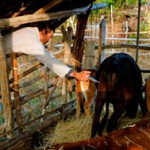
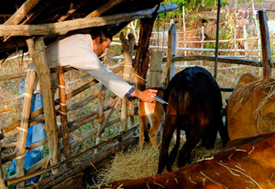
Thongphet received training in animal husbandry after he was injured by a piece of ordnance that exploded under a fire he built.
Survivors of unexploded ordnance (UXO) accidents in Laos often become physically or emotionally disabled after their accidents. For many UXO survivors, injuries prevent them from returning to work, and their families fall into hardship because of medical costs and decreased income. With the support of groups including the McKnight Foundation, the U.S. Department of State/Office of Weapons Removal and Abatement, AAR, the Embassy of the Netherlands in Bangkok, and the Niarchos Foundation, World Education built the capacity of UXO and landmine survivors and their families in Xieng Khouang and Houaphan provinces to achieve long term economic self-sufficiency in a variety of ways.
World Education assisted UXO survivors’ return to school and provided emergency medical funds for accident victims. World Education staff surveyed the physical, psychological, and economic needs of survivors and subsequently implemented vocational skills training in animal husbandry, tailoring, and weaving. The project arranged for school-aged UXO survivors to receive tutoring assistance and meet with peer discussion groups to support their adjustment back into schools and return to a healthy, normal life. Partner organization funds also enabled World Education to develop systems to increase donations to the War Victims Medical Fund, which helps to defray medical costs for UXO survivors.
Click here for information on World Education’s current victims assistance project, the War Victims Medical Fund.
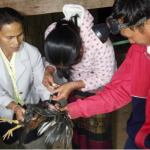
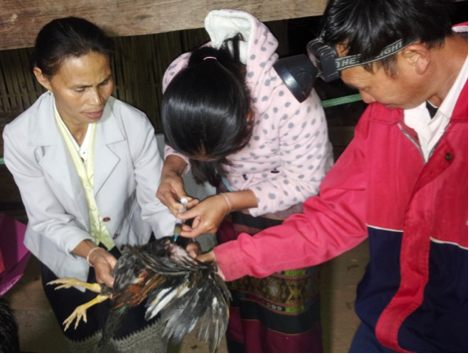 For the survivors of a traumatic UXO incident, the medical care often costs more than the average family’s annual income, and survivors who have serious injuries to the face, torso, and arms frequently cannot return to the jobs in which they were formerly employed. The Survivors’ Economic and Technical Assistance (SETA) project worked to improve the economic situation for 160 UXO survivors and their families in Salavan and Xieng Khouang provinces, two areas of Laos impacted the most by unexploded remnants of war.
For the survivors of a traumatic UXO incident, the medical care often costs more than the average family’s annual income, and survivors who have serious injuries to the face, torso, and arms frequently cannot return to the jobs in which they were formerly employed. The Survivors’ Economic and Technical Assistance (SETA) project worked to improve the economic situation for 160 UXO survivors and their families in Salavan and Xieng Khouang provinces, two areas of Laos impacted the most by unexploded remnants of war.
SETA provided vocational and economic assistance to UXO and landmine survivors through medical care, training courses, small business startup support, and follow-up technical assistance. Through funding from the War Victims Medical Fund, the project supported emergency and follow-up medical care for survivors after injury. World Education provided training in trades that the survivors were capable of performing, such as animal husbandry, fish farming, weaving, and tailoring. It also provided small grants to UXO survivors so that they could invest in initial purchase of animals or in vaccines, food, and materials needed to establish a tenable trade. Throughout the course of training and during follow-up, SETA staff discussed economic planning principles with recipients to help them make business decisions about spending their funds. UXO survivors who completed this course of technical training averaged a 30% profit and consistently reinvested their profits back into their businesses.



